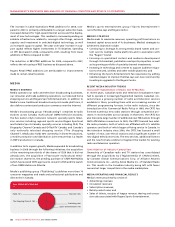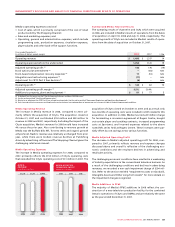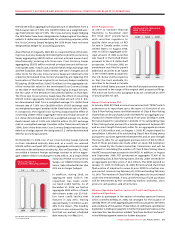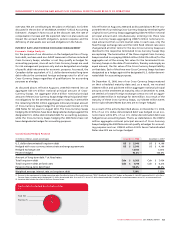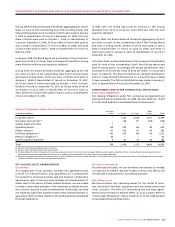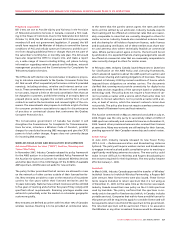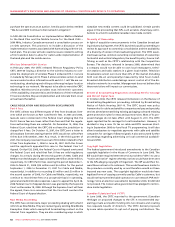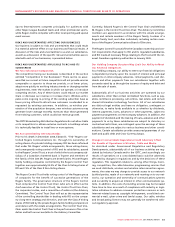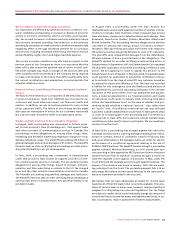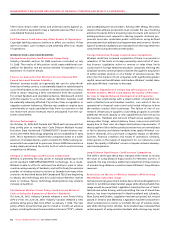Rogers 2008 Annual Report Download - page 60
Download and view the complete annual report
Please find page 60 of the 2008 Rogers annual report below. You can navigate through the pages in the report by either clicking on the pages listed below, or by using the keyword search tool below to find specific information within the annual report.
56 ROGERS COMMUNICATIONS INC. 2008 ANNUAL REPORT
MANAGEMENT’S DISCUSSION AND ANALYSIS OF FINANCIAL CONDITION AND RESULTS OF OPERATIONS
4. OPERATING ENVIRONMENT
Additional discussion of regulatory matters and recent develop-
ments specific to the Wireless, Cable and Media segments follows.
GOVERNMENT REGUL ATION AND REGULATORY
DEVELOPMENTS
Substantially all of our business activities, except for Cable’s
Rogers Retail segment and the non-broadcasting operations of
Media, are subject to regulation by one or more of: the Canadian
Federal Department of Industry, on behalf of the Minister of
Industry (Canada) (collectively, “Industry Canada”), the CRTC under
the Telecommunications Act (Canada) (the “Telecommunications
Act”) and the CRTC under the Broadcasting Act (Canada) (the
“Broadcasting Act”), and, accordingly, our results of operations are
affected by changes in regulations and by the decisions of these
regulators.
Canadian Radio-television and Telecommunications
Commission
Canadian broadcasting operations, including our cable television
systems, radio and television stations, and specialty services are
licenced (or operated pursuant to an exemption order) and regu-
lated by the CRTC pursuant to the Broadcasting Act. Under the
Broadcasting Act, the CRTC is responsible for regulating and super-
vising all aspects of the Canadian broadcasting system with a view
to implementing certain broadcasting policy objectives enunciated
in that Act.
The CRTC is also responsible under the Telecommunications Act for
the regulation of telecommunications carriers, which includes the
regulation of Wireless’ mobile voice and data operations and Cable’s
Internet and telephone services. Under the Telecommunications Act,
the CRTC has the power to forbear from regulating certain services
or classes of services provided by individual carriers. If the CRTC finds
that a service or class of services provided by a carrier is subject to a
degree of competition that is sufficient to protect the interests of
users, the CRTC is required to forbear from regulating those services
unless such an order would be likely to unduly impair the establish-
ment or continuance of a competitive market for those services.
All of our Cable and telecommunications retail services have been
deregulated and are not subject to price regulation. However, regu-
lations can and do affect the terms and conditions under which we
offer these services. Accordingly, any change in policy, regulations
or interpretations could have a material adverse effect on Cable’s
operations and financial condition and operating results.
Copyright Board of Canada
The Copyright Board of Canada (“Copyright Board”) is a regula-
tory body established pursuant to the Copyright Act (Canada) (the
“Copyright Act”) to oversee the collective administration of copy-
right royalties in Canada and to establish the royalties payable
for the use of certain copyrighted works. The Copyright Board is
responsible for the review, consideration and approval of copy-
right tariff royalties payable to copyright collectives by Canadian
broadcasting undertakings, including cable, radio, television and
specialty services.
Industry Canada
The technical aspects of the operation of radio and television
stations, the frequency-related operations of the cable television
networks and the awarding and regulatory supervision of spectrum
for cellular, messaging and other radio-telecommunications systems
in Canada are subject to the licencing requirements and oversight
of Industry Canada. Industry Canada may set technical standards for
telecommunications under the Radiocommunication Act (Canada)
(the “Radiocommunication Act”) and the Telecommunications Act.
Restrictions on Non-Canadian Ownership and Control
Non-Canadians are permitted to own and control directly or indi-
rectly up to 33.3% of the voting shares and 33.3% of the votes of a
holding company that has a subsidiary operating company licenced
under the Broadcasting Act. In addition, up to 20% of the voting
shares and 20% of the votes of the operating licencee company may
be owned and controlled directly or indirectly by non-Canadians.
The chief executive officer and 80% of the members of the Board
of Directors of the operating licencee must be resident Canadians.
There are no restrictions on the number of non-voting shares that
may be held by non-Canadians at either the holding-company or
licencee-company level. Neither the Canadian carrier nor its parent
may be otherwise controlled in fact by non-Canadians. The CRTC
has the jurisdiction to determine as a question of fact whether a
given licencee is controlled by non-Canadians.
Pursuant to the Telecommunications Act and associated regula-
tions, the same rules apply to Canadian carriers such as Wireless,
except that there is no requirement that the chief executive officer
be a resident Canadian. The same restrictions are contained in the
Radiocommunication Act and associated regulations.
In July 2007, the federal government appointed the Competition
Policy Review Panel. Among other things, this panel examined for-
eign ownership rules in Canada’s communications sector and in
June 2008 issued its report. While this panel and its report have
no force of law, the report recommended that non-Canadians be
permitted to start new telecommunications carriers in Canada and
to purchase existing carriers which have less than 10 percent of the
Canadian telecommunications market. The report further recom-
mends that after five years, following a review of broadcasting
and cultural policies including foreign investment, telecommuni-
cations and broadcasting foreign ownership restrictions should be
liberalized in a manner that is competitively neutral for telecom-
munications and broadcasting companies. There is no certainty of
implementation. Similar recommendations have been made as a
result of previous studies over the past several years which did not
result in any changes by government.
Policy Direction to the CRTC on Telecommunications
In December 2006, the Minister of Industry issued a Policy Direction
on Telecommunications to the CRTC under the Telecommunications
Act. The Direction instructs the CRTC to rely on market forces to the
maximum extent feasible under the Telecommunications Act and
regulate, if needed, in a manner that interferes with market forces
to the minimum extent necessary.




